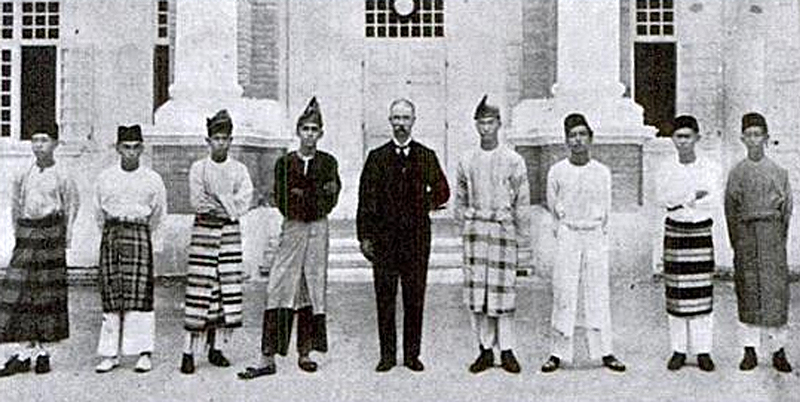When Malays were Brown Englishmen and not Arabs

The first and fundamental thing to do is to un-politicise education and restore the education system to what the British had intended in 1900. I would like to believe that I am a product of a British education. We played rugby and cricket, had tea at 4.00pm, and enjoyed our cigar and brandy/whiskey after dinner (may the Lord forgive me). But then we Malays of the Merdeka era were ‘Brown Englishmen’. And then came the politicians who messed everything up and turned the Malays into Arabs (may the Lord forgive them). And that is all I want to say on the subject lest the Islamists start shouting ‘infidel’.
NO HOLDS BARRED
Raja Petra Kamarudin
(Bernama) – The Council of Eminent Persons (CEP) has given the assurance that Bumiputera contractors will continue to be assisted under the new government, said Malaysian Malay Contractors Association President, Datuk Mokhtar Samad.
He was among those summoned by the Council to identify improvements that could be taken to assist the Bumiputera contractors.
“The CEP, chaired by Tun Daim Zainuddin, has guaranteed that the new government will help Bumiputera contractors using better ways than what was done before.

Malaysian Malay Contractors Association president Mokhtar Samad said Malay contractors will continue to get opportunities from the new government
**************************************************************************************************
That latest development (read above) brings back the 30-year-old debate of 1985-1991 when the Bumiputera business community and the Malay Chamber of Commerce and Industry conducted a series of dialogues, forums and seminars as to what to do post-NEP or after the New Economic Policy expires in 1990.
Most Malaysians do not understand the difference between Article 153 and the New Economic Policy of 1970-1990. Actually, they are two different issues although they are in a way inter-related. The New Economic Policy of 1970-1990 was a response to the 13th May 1969 race riots, which Tun Dr Mahathir Mohamad, in his ‘Open Letter’, blamed on the First Prime Minister Tunku Abdul Rahman.
Mahathir said the Malays were very unhappy that they were being ‘left behind’ and that is why they rioted. So, the government came out with its poverty eradication program, the New Economic Policy, to address this economic imbalance between the Malays and the Chinese and to close the gap between the haves and the have-nots regardless of race (which means the NEP was also for the non-Malays).

The task of rebuilding Malaysia has to start with the education system that got destroyed in the 1980s
However, even before the NEP of 1970, the British had already come out with their own program on how to look after the Malays. Soon after the formation of the Federation of Malays in 1948, Umno began negotiating Merdeka with the British and Malaya’s colonial masters knew it would be a matter of time before the country would have to be given independence.
In 1950, the British formed the Rural & Industrial Development Authority or RIDA to look after the interest and welfare of the Malays. In 1956, the RIDA Training Centre was set up to train and educate the Malays. A year later, Malaya was granted independence or Merdeka.
On 1st March 1966, RIDA was changed to MARA (Majlis Amanah Rakyat) and the RIDA Training Centre to MARA College. In 1967, it became the MARA Institute of Technology and in 1999 Mahathir turned it into a university, Universiti Teknologi MARA or UiTM.

The British concern was in educating the Malays
Even earlier than that, around 1900, the British were already concerned about educating the Malays. On 24th February 1904, R J Wilkinson, the inspector of schools for the Federated Malay States (F.M.S), wrote to the resident-general about ‘establishing at a suitable locality in the F.M.S., a special residential school for the education of Malays of good family and for the training of Malay boys for admission to certain branches of Government service’.
The four F.M.S rulers — Sultan Idris Murshidul ‘Adzam Shah I of Perak, Sultan Alaiddin Sulaiman Shah of Selangor, Yam Tuan Tuanku Muhammad Shah of Negeri Sembilan and Sultan Ahmad Mu’adzam Shah of Pahang — supported the move and on 2nd January 1905 the Malay Residential School was set up in Kuala Kangsar, known then as the Eton of the East.
So, 114 years ago, the concern of the British colonial masters and the Malay rulers was about educating the Malays. And, since the NEP was launched almost 50 years ago, about five million Malays have been given higher and/or tertiary education. That is no small feat for a race that used to be 99% peasants.

The British plan was for the Malays to administer the country while the Chinese engage in commerce
Currently, the focus of the Bumiputera policy is only on business, contracts, permits, licences, quotas, discounts for Malays who buy property, and so on — in short, economic activities. But the policy is more than just that and education is more important than contracts, permits, licences, quotas, etc.
How often have we not heard the saying ‘teach them how to fish and not give them a fish’ being uttered? I first heard that saying in 1977 when a Thai Rotary Club member told us about how they eradicate poverty in Thailand: they teach Thais how to fish instead of giving them a fish. And that is what Malaysia’s policy was also supposed to be about: to teach Malays how to fish (and to date five million Malays have been taught that).
The first and fundamental thing to do is to un-politicise education and restore the education system to what the British had intended in 1900. I would like to believe that I am a product of a British education. We played rugby and cricket, had tea at 4.00pm, and enjoyed our cigar and brandy/whiskey after dinner (may the Lord forgive me). But then we Malays of the Merdeka era were ‘Brown Englishmen’. And then came the politicians who messed everything up and turned the Malays into Arabs (may the Lord forgive them). And that is all I want to say on the subject lest the Islamists start shouting ‘infidel’.

First Prime Minister Tunku Abdul Rahman and First Agong Tuanku Abdul Rahman when the Malays were still Brown Englishmen and not yet Arabs

